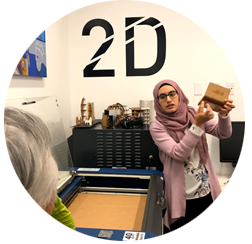About

My name is Samar (pronounced Summer). I have just started as an Assistant Professor at the Institute of Communication, Culture, Information and Technology at the University of Toronto where I will be directing the Open Design Collaboratorium. I also hold a graduate appointment at the Daniels Faculty of Architecture, Design, and Landscape. In April 2023, I finished a Postdoctoral Research Fellowship at the Toronto Climate Observatory – University of Toronto, advised by Dr. Robert Soden and Dr. Steve Easterbrook.
I completed my Ph.D. in 2022 the Department of Information Science at Cornell University/Cornell Tech, and was advised by Dr. Tapan Parikh, Dr. Steven J. Jackson, and Dr. Wendy Ju. Before Cornell, I was a student at the University of Toronto where I completed a B.Sc with a double major in Architecture and Computer Science (2007), a professional Master of Architecture (2015), and an M.Sc in Computer Science (2017).
My passion for research started early on as an undergrad. Some areas I worked in include micro-simulation urban modeling engines, climate change modelling and scientific collaboration, and responsive architecture. My pre-doctoral graduate research focused on envisioning ways to build better shelters in refugee camps by leveraging the affordances of Information and Communication Technologies (ICTs). My M.Arch thesis “Architecture for Long Term Refugee Relief: A Design and Policy Manual – Middle East Edition” won the Irving Grossman Prize.
Since moving to Cornell in 2017, the focus of my work shifted to examining how design as a socio-material practice supports communities in reconfiguring or reimagining the environments they inhabit in more equitable ways despite cultural, generational, and political differences. My research style involves bringing community groups together, using design as explorative, expressive, evocative, and reflective processes, and working from there to collectively negotiate, reimagine, or enact change. Through facilitating such amalgamations within civic contexts in New York City, my Ph.D. dissertation argues that design driven by a making-unmaking dialectic can offer potentially rich opportunities to further the ways through which communities participate in directing the course and pace of social change.

